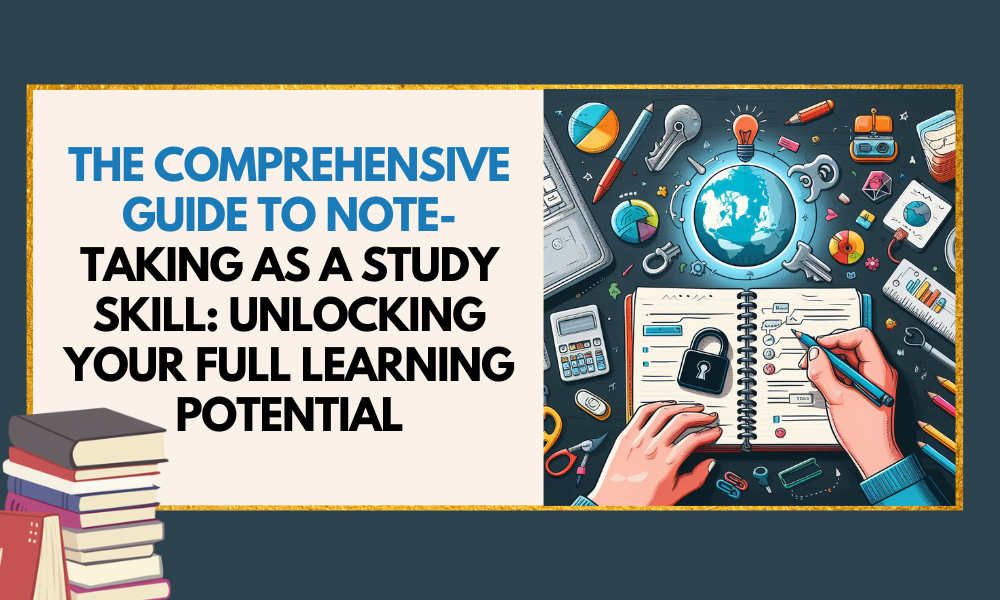
Introduction
Among the many learning skills and techniques, there is one that represents the foundation of successful learning: writing. Writing has been a practice since the beginning of education. Whether you’re a high school student preparing for finals, a college graduate, or a professional looking to learn new skills; The art of taking notes while lecturing, discussing, or reading is still important to understanding., understand, understand. Maintain and apply knowledge. In this comprehensive guide, we’ll dive into the world of writing and discover how it can help you become a successful, productive student.
- The importance of writing
Good writing is more than just writing words on paper or on the screen. This is a skill that helps you process, understand and synthesize information. Here are some reasons why this is so important for all students:
- Improve comprehension: Writing forces you to interact with the material. It encourages you to pull out the most important points to gain a deeper understanding of the topic.
- Organization and Structure: Essays show the basic structure of the topic at hand. This organization makes it easier to follow thoughts and the progress of ideas, allowing for a better understanding of difficult topics.
- Retrieval practice: Reviewing the text is an effective retrieval practice that helps consolidate information in memory. You learn secondhand information by summarizing and repeating.
- Personal: Your writing corresponds to your understanding and learning. These can include personal insights, metaphors and connections about you and help preserve them for the long term.
- Effectiveness: Your notes become a handy reference when you need to brush up on topics or prepare for an exam. This can help you save time and reduce the need to review the entire book or lesson.
- Types of writing
Note-taking is not a one-size-fits-all concept. It comes in different types and allows you to choose the path that suits your learning and learning environment:
- Cornell Method: The Cornell method involves dividing the page into three sections: one for the main content and another for the summary and conclusion. This method is good for organizing content.
- Mind Maps: Visual learners may prefer mind maps that use diagrams to connect important concepts and ideas. It is ideal for topics that contain a lot of related information.
- Structures: A structure is a layer where you use bullets to break down data into structured, easy-to-read forms.
- Sentence Method: This method involves writing complete sentences on a single line. It is useful for writing detailed information and is a good choice for writing lectures.
- Digital writing: Writing in the digital age has become a technology. Use apps and software like Evernote, OneNote, or Notes to easily access, search, and share your notes.
- Digital Notes etc. Traditional Notes
In the digital age, tools are everywhere and you may be wondering whether to choose traditional paper and print notes or embrace the world digitally. Both methods have their advantages, and the final choice depends on your preferences. While digital notebooks offer the advantages of ease of searching and sharing, traditional notebooks have advantages such as writing and the feeling of being away from the screen.
- Tips to get good results
Writing good articles requires a good approach. Here are some tips to maximize your writing skills:
- Listening and participation: Pay attention when speaking or reading. Read the site carefully, identifying key points and supporting points.
- Use abbreviations and symbols: Create abbreviations and symbols to speed up the writing process. For example, use “w/” to mean “with” or “→” to mean “with”.
- Stay Organized: Keep your notes organized by using methods or page and chapter lists. A clear pattern helps with retrieval later.
- Review and Edit: Review and edit your text regularly to improve your understanding. Consider the content of your text in your message to complete the information.
- Practice regularly: The more you practice writing, the better you get. Try writing from different sources to improve your skills.
- Collaboration: If you are in a class or study group, exchange notes with others. It can provide a different perspective and help you fill in gaps in your understanding.
- Note-Taking Research
Writing is more than performance; It is at the core of cognitive science. Researchers have found that the act of writing improves the brain’s comprehension, retention, and retention abilities. This study shows the process of the product.
- Writing and learning:
A dynamic partnership Writing and learning go hand in hand. Your notes can be useful information to help you consolidate your knowledge and prepare for the exam. Combining good writing with a good study plan can lead to good academic results.
Conclusion
Writing for Lifelong Learning Writing is not limited to technical education; It’s a skill you can apply to anything in your life. Whether you’re attending a meeting, learning a new task, or trying to remember important information about your job, writing can be your forever reliable companion for on-the-go learning. By using a variety of writing methods and consistently practicing this skill, you will not only succeed in your studies, but you will also gain valuable tools to continue studying and personal development indefinitely. So grab your notebook, open your writing app, or grab your favorite pen and begin the journey of learning better through the art of writing. Remember, the best essays are those that reflect your personal style and perspective, making them the key to unlocking your full academic potential.